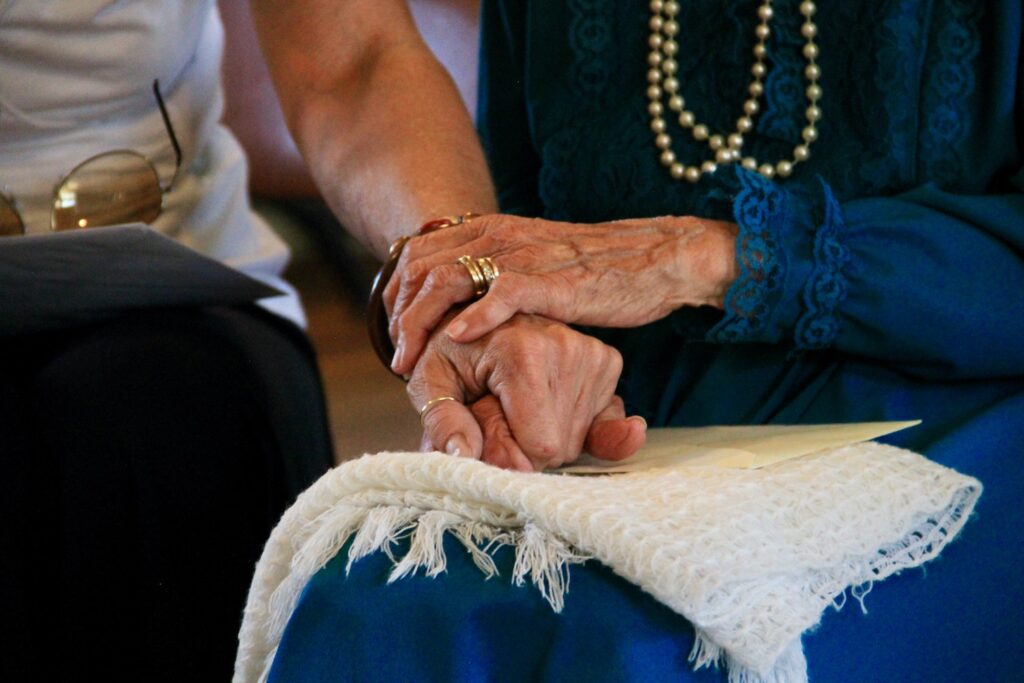
Dementia is an umbrella term that includes various medical disorders related to cognition. Of the diseases that fall under the general term “dementia,” Alzheimer’s accounts for up to 80% of diagnoses. Dementia is most common in the older population. About one-third of people age 85 or older may have some form of dementia. It can be hard for family members to know how to respond to dementia behaviors.
People living with and managing dementia experience a progressive decline in thinking skills, impairing their daily life and ability to function independently. Additionally, dementia can cause uncontrollable mood swings and negatively affect a person’s behavior, feelings, and relationships. Everyone’s symptoms will vary depending on the type of dementia they have and what stage it’s in.
Helping someone with dementia can be draining both physically and emotionally. People with dementia challenge caregivers and can worry family members. It’s heartbreaking to see a loved one change, losing their personality to a brain disorder they can’t help.
If you’re dealing with a parent with dementia or wondering how to help a person with dementia, we’ve got some tips for you. In this blog, you’ll learn how to handle a parent with dementia, how to respond to dementia behaviors, and where to find dementia care.
How to Handle Elderly Adults With Dementia
Over time, older adults with dementia will depend more on others to care for them. Consider these practical tips, which will help you learn how to deal with someone who has dementia.
Ask simple questions. Try to avoid asking open-ended questions that require a thoughtful response. Questions with yes or no answers are ideal. Visual prompts (i.e., holding up the shirt you’re asking if they’d like to wear) are particularly helpful.
Create a safe environment. Dementia impairs judgment, increasing a person’s risk of injury. Assess your home for hazards to keep those living with dementia safe. Take precautions early and reevaluate them often:
- Clear away throw rugs, cords, and clutter to prevent falls
- Install handrails in critical areas (e.g., stairs, shower)
- Lock up potentially dangerous substances (e.g., medicine)
- Lock doors that lead outside to prevent wandering
- Keep matches and lighters out of reach
- Insert safety plugs into open electrical outlets
- Lower the hot water temperature to prevent burns
Find helpful activities. Games for seniors with dementia engage their brains and help slow down dementia symptoms. Additionally, doing activities and playing games together allows you to not only preoccupy them but spend quality time with your loved one.
Keep a daily routine. Try your best to keep a routine, such as bathing, eating, and exercising (i.e., afternoon walks) at the same times every day. Routines add a sense of order to the day, reducing anxiety in people living with dementia because they know what to expect.
Take your time. Anticipate that chores will take longer than expected. Be patient and schedule more time than you think will be needed to allow for breaks. During tasks like getting dressed, tell the person what you’re going to do and move slowly, so they aren’t surprised.
How to Respond to Dementia Behaviors
One of the hardest parts of seeing a loved one’s dementia progress is the way their behavior changes. We have some tips for you if you’re wondering how to live with someone with dementia who is displaying troubling behavior.
1. Don’t take it personally
One thing to remember from the beginning is not to take things personally. People with dementia may lash out and say things they don’t mean but don’t take it to heart; it’s the disease talking.
2. Assess needs
Typically, those with dementia have a hard time communicating their needs. Sometimes, instead of using their words, they act out or perform odd behaviors to get your attention. Assess the needs of dementia patients regularly to get ahead of these behaviors.
3. Identify triggers
Keep in mind that all dementia behaviors are caused by something. It could be a sudden noise, something someone did or said, or an unfamiliar place. Whatever the case, do your best to communicate and identify what triggered a certain behavior to avoid it in the future.
4. Stay calm
This is easier said than done. For example, if your elderly mother is suddenly agitated and starts yelling at you, don’t yell back and escalate the situation. Instead, do your best to stay calm in situations like this and employ the four R’s: Reassure, reorient, redirect, and reminisce.
5. Be flexible
The key to knowing how to respond to dementia behaviors is being both flexible and creative in your caregiving strategies. What works today may not work tomorrow or will need to be modified at some point, so prepare to adapt to those changes.
Coping With Dementia for Family Caregivers
In this section, we explain how to begin coping with dementia for caregivers who are learning how to help a parent with dementia.
Being a caregiver has its ups and downs. Some days it’s rewarding, while others can be overwhelming. At the end of the day, it’s important to take care of yourself. Once you take on the role of being a family caregiver, it’s easy to keep adding responsibilities to your plate. Remember that it’s okay to ask for help.
Here are some tips to keep in mind as you learn how to deal with dementia parents.
Plan for the future. Making healthcare decisions for someone who can’t do so themselves is a difficult position to be in. Start discussions early with your parents so they can be involved in the decision-making process before their dementia advances.
Join a support group. Don’t give up your social life and hobbies. It’s important for you to feel like you’re living a full life even as you care for an aging parent. Join a caregiver support group to help you cope, and keep you from feeling isolated.
Find respite care. Family members often feel guilty if they can’t care for their parents. And if they do provide care, they feel like they can’t take a day off; this is your permission to prioritize yourself. Respite care offers family caregivers a guilt-free, temporary break to manage their personal health and responsibilities, knowing that their elderly parent is in good hands.
Hire professional help. You don’t have to have all the answers or feel totally responsible for an aging parent’s care. As an adult child learning how to deal with a dementia-diagnosed mother, your primary role is to be their son or daughter. Consider reaching out to a local care management agency that can help you navigate elder care.
Helping Someone With Dementia? Ask About Dementia Care
Hopefully, you’ve learned some helpful tips on how to deal with a person with dementia and how to respond to dementia behaviors. If you’re helping someone with dementia and need support, reach out to Stowell Associates.
At Stowell Associates, we’ve been dedicated to caring for elderly adults and supporting their families for nearly 40 years. We’ve recently partnered with TheKey, a home care company that’s delivered high-quality in-home care to seniors for 20 years. Their trained caregivers have experience supporting older adults with a wide range of age-related conditions like dementia.
If you’re the adult child of an elderly parent with dementia, contact Stowell Associates. Our expert geriatric care managers can provide you with valuable care resources and identify the best options regarding your parent’s care.













